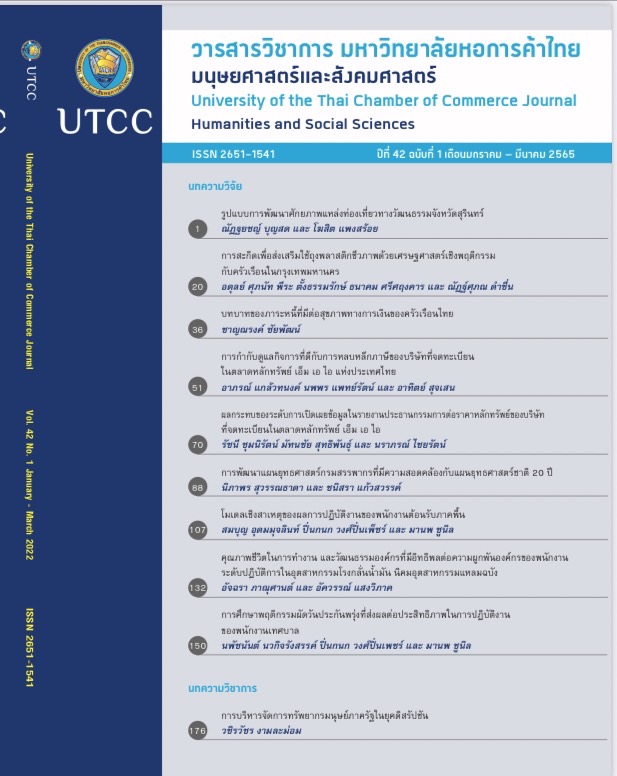Quality of Work Life and Organizational Culture Influencing Organizational Commitment of Employees at Operating Level of Oil Refinery Industry in Laem Chabang Industrial Estate
Main Article Content
Abstract
This research aims to study the quality of working life and organizational culture that influence the organizational commitment of the operating level employees at the oil refinery industry in Laem Chabang Industrial Estate. This research is a quantitative research. The sample that use in the research were 330 employees at the oil refinery industry in Laem Chabang Industrial Estate by using quota sampling. Choosing samples by consider the proportion of the population. The study instrument was a questionnaire which consisted of closed-ended and open-ended questions. Data were analyzed by using multiple regression analysis. The research find that adequate compensation, advancement in the work, the balance between work and personal life and the development of employees' abilities have a positive influence on the organizational commitment of the operating level employees at a statistically significant level of 0.05.Besides that, participative culture and adaptive corporate culture have a positive influence on the organizational commitment of operational staff at the refinery industry in Laem Chabang Industrial Estate at a statistically significant level of 0.05.
Article Details

This work is licensed under a Creative Commons Attribution-NonCommercial-NoDerivatives 4.0 International License.
ลิขสิทธิ์ของบทความ
ผลงานที่ได้รับการตีพิมพ์ถือเป็นลิขสิทธิ์ของมหาวิทยาลัยหอการค้าไทย ห้ามมิให้นำเนื้อหา ทัศนะ หรือข้อคิดเห็นใด ๆ ของผลงานไปทำซ้ำ ดัดแปลง หรือเผยแพร่ ไม่ว่าทั้งหมดหรือบางส่วนโดยไม่ได้รับอนุญาตเป็นลายลักษณ์อักษรจากมหาวิทยาลัยหอการค้าไทยก่อน
References
กัญญา รอดพิทักษ์. (2551). วัฒนธรรมองค์การที่มีผลต่อความผูกพันต่อองค์การของพนักงานธนาคารออมสิน ฝ่ายกิจการนครหลวง 3 เขตศิริ (วิทยานิพนธ์ปริญญามหาบัณฑิต ไม่ได้ตีพิมพ์). มหาวิทยาลัยราชภัฏธนบุรี, กรุงเทพฯ.
กันต์สุดา โกญจนาท. (2559). การศึกษาวัฒนธรรมองค์กร กระบวนการทํางาน และการรับรู้ในกระบวนการทํางานที่มีผลต่อความผูกพันของพนักงานระดับปฏิบัติการ บริษัท หัวเว่ย เทคโนโลยี (ประเทศไทย) จํากัด (วิทยานิพนธ์ปริญญามหาบัณฑิต ไม่ได้ตีพิมพ์). มหาวิทยาลัยกรุงเทพ.
ณัฏฐพันธ์ เขจรนันทน์. (2551). พฤติกรรมองค์การ. กรุงเทพฯ: ซีเอ็ดยูเคชั่น.
ดวงสมร มะโนวรรณ. (2561). คุณภาพชีวิตการทำงานกับความผูกพันต่อองค์กรของพยาบาลที่สังกัด โรงพยาบาลในกรุงเทพมหานคร. วารสารวิชาการบริหารธุรกิจ, 7(1), 178-190.
ธนาคารกรุงศรีอยุธยา, วิจัยกรุงศรี. (2562). แนวโน้มธุรกิจ/อุตสาหกรรม ปี 2560-62 อุตสาหกรรมโรงกลั่นน้ำมัน. สืบค้นเมื่อ 4 กุมภาพันธ์ 2563, จาก https://www.krungsri.com/bank/getmedia/a6158442-a7be-44a9-a841-ac3cac89ea63/IO_Refinery_201705_TH.aspx
บุญชม ศรีสะอาด. (2553). การวิจัยเบื้องต้น (พิมพ์ครั้งที่ 8). กรุงเทพฯ: สุวีริยสาสน์.
ประพันธ์ ชัยกิจอุราใจ. (2561). คุณภาพชีวิตในการทำงานที่มีผลต่อความผูกพันต่อองค์กรและ ประสิทธิภาพ ในการปฏิบัติงานของพนักงานในกลุ่มอุตสาหกรรมไฟฟ้า อิเล็กทรอนิกส์และโทรคมนาคม (วิทยานิพนธ์ปริญญามหาบัณฑิต ไม่ได้ตีพิมพ์). มหาวิทยาลัยศรีปทุม, กรุงเทพฯ.
ประสพชัย พสุนนท์. (2553). สถิติธุรกิจ. กรุงเทพฯ: สถาบันเทคโนโลยีไทย-ญี่ปุ่น.
ปรีดี อิทธิพงศ์. (2552). ความสัมพันธ์ระหว่างการรับรู้ความยุติธรรมในองค์การ คุณภาพชีวิตการทำงาน และความผูกพันต่อองค์การ กรณีศึกษาโรงงานอุตสาหกรรมเหล็กแห่งหนึ่ง (การค้นคว้าอิสระปริญญามหาบัณฑิต ไม่ได้ตีพิมพ์). มหาวิทยาลัยธรรมศาสตร์, กรุงเทพฯ.
ผจญ เฉลิมสาร. (2557). ปัจจัยจูงใจ ปัจจัยค้ำจุน และคุณภาพชีวิตในการทํางานที่ส่งผลต่อความจงรักภักดีของผู้ปฏิบัติงานในองค์กร กรณีศึกษาการไฟฟ้าฝ่ายผลิตแห่งประเทศไทย (การค้นคว้าอิสระปริญญามหาบัณฑิต ไม่ได้ตีพิมพ์). มหาวิทยาลัยกรุงเทพ.
มณฑิตา ศรีนคร. (2563). ผลของภาวะผู้นำการเปลี่ยนแปลง วัฒนธรรมองค์กรและความผูกพันยึดมั่นในงานที่ส่งผลต่อประสิทธิภาพการทำงานของพนักงานระดับปฏิบัติการ อุตสาหกรรมยานยนต์และชิ้นส่วนยานยนต์ในนิคมอุตสาหกรรมแหลมฉบัง จังหวัดชลบุรี. วารสารวิทยาลัยพาณิชยศาสตร์บูรพาปริทัศน์, 15(1), 120-133.
รุ่งนภา สีทะ. (2554). ความสัมพันธ์ระหว่างการรับรู้ความยุติธรรมในองค์การกับความผูกพันต่อองค์การของข้าราชการสำนักงานกิจการสตรีและสถาบันครอบครัว กระทรวงการพัฒนาสังคมและความมั่นคงของมนุษย์. วารสารวิจัยรำไพพรรณณี, 11(3), 184-191.
สมคิด บางโม. (2560). องค์การและการจัดการ. กรุงเทพฯ: วิทยพัฒน์.
สรสุดา แก่นจันทร์. (2561). การรับรู้บรรยากาศองค์กร ความผูกพัน ความพึงพอใจในการทำงาน ที่มี อิทธิพลต่อการแสดงพฤติกรรมการเป็นสมาชิกที่ดีของบุคลากรสถาบันอุดมศึกษากลุ่มใหม่ในเขตกรุงเทพและปริมณฑล (วิทยานิพนธ์ปริญญามหาบัณฑิต ไม่ได้ตีพิมพ์). มหาวิทยาลัยเทคโนโลยีราชมงคลธัญบุรี, ปทุมธานี.
อัจฉรา ภาณุศานต์. (2564). คุณภาพชีวิตในการทำงาน และวัฒนธรรมองค์กร ที่มีอิทธิพลต่อความผูกพันองค์กรของพนักงานระดับปฏิบัติการ อุตสาหกรรมโรงกลั่นน้ำมัน ในนิคมอุตสาหกรรมแหลมฉบัง (วิทยานิพนธ์ปริญญาธุรกิจมหาบัณฑิต). มหาวิทยาลัยเกษตรศาสตร์.
Allen, N. J., & Meyer, J. P. (1990). The measurement and antecedents of affective, continuance and normative commitment to the organization. Journal of Occupational Psychology, 63(1), 1-18. https://doi.org/10.1111/j.2044-8325.1990.tb00506.x
Cameron, K. S., & Quinn, R. E. (2006). Diagnosing and changing organizational culture: Based on the competing values framework. San Francisco, CA: Jossey-Bass.
Das, B. L., & Baruah, M. (2013). Employee retention: A review of literature. IOSR Journal of Business and Management, 14(2), 8-16.
Denison, D. R., Haaland, S., & Goelzer, P. (2004). Corporate culture and organizational effectiveness: Is Asia different from the rest of the world? Organizational Dynamics, 33(1), 98–109. https://doi.org/10.1016/j.orgdyn.2003.11.008
Louis, R. N. (1998). Participation productivity and quality of work life. London, England: Prentice-Hall.
Mowday, R. T., Porter, L. W., & Steers, R. M. (1982). Employee-organization linkages: The psychology of commitment, absenteeism and turnover. New York, NY: Academic Press.
Porter, L. W., Steers, R. M., Mowday, R. T., & Boulian, P. V. (1974). Organizational commitment, job satisfaction, and turnover among psychiatric technicians. Journal of Applied Psychology, 59(5), 603–609. https://doi.org/10.1037/h0037335
Schein, E. H. (2004). Organizational culture and leadership. San Francisco, CA: Jossey-Bass.
Walton, R. E. (1973). Quality of working life: What is it? Stone Management Review, 15(1), 11-21.
Umstot, D. D. (1984). Understanding organization behavior. Eagan, MN: West Publishing.


